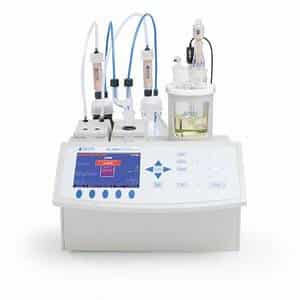Titration Karl Fischer Coulometric
What is Karl Fischer Titration?
The Karl Fischer Titration is a titration method for measuring water content in basically all types of substances. It was invented in 1935 by the German chemist Karl Fischer.
The Karl Fischer Titration is based on an iodine / iodid reaction: The water reacts with iodine. The endpoint of the titration is reached when all the water is consumed
The titration process uses an organic base, sulphur dioxide, iodine and an alcohol. Modern Karl Fischer reagents are available which are less toxic (no more pyridine but imidazole as organic base, ethanol instead of methanol) and which provide a faster reaction.
Coulometric Titration
In the Coulometric Karl Fischer Titration the iodine is electrolytically generated. The amount of idodine added to the sample is determined by measuring the current needed for the electrochemical generation of the iodine. When reacting with water, the brown iodine is reduced to the colourless iodide.
It is recommended the method is chosen depending on the water content of the samples to be measured:
the coulometric method is suitable for samples with a low water content (10 μg … 100 mg)
the volumetric method is suitable for samples with a higher water content (0.1 … 500 mg).
Showing the single result

